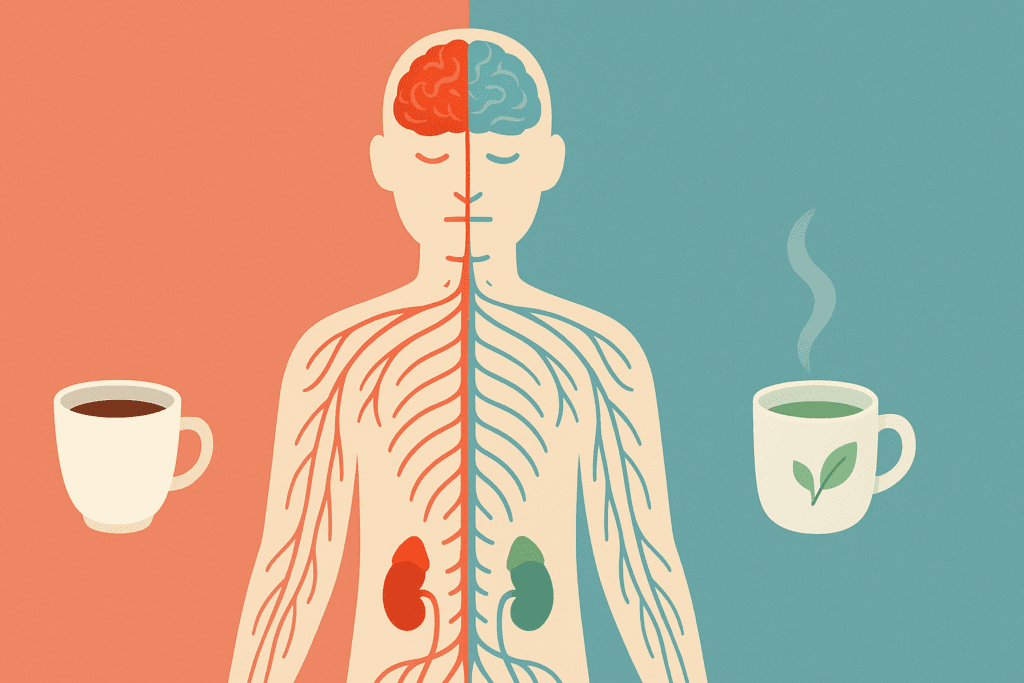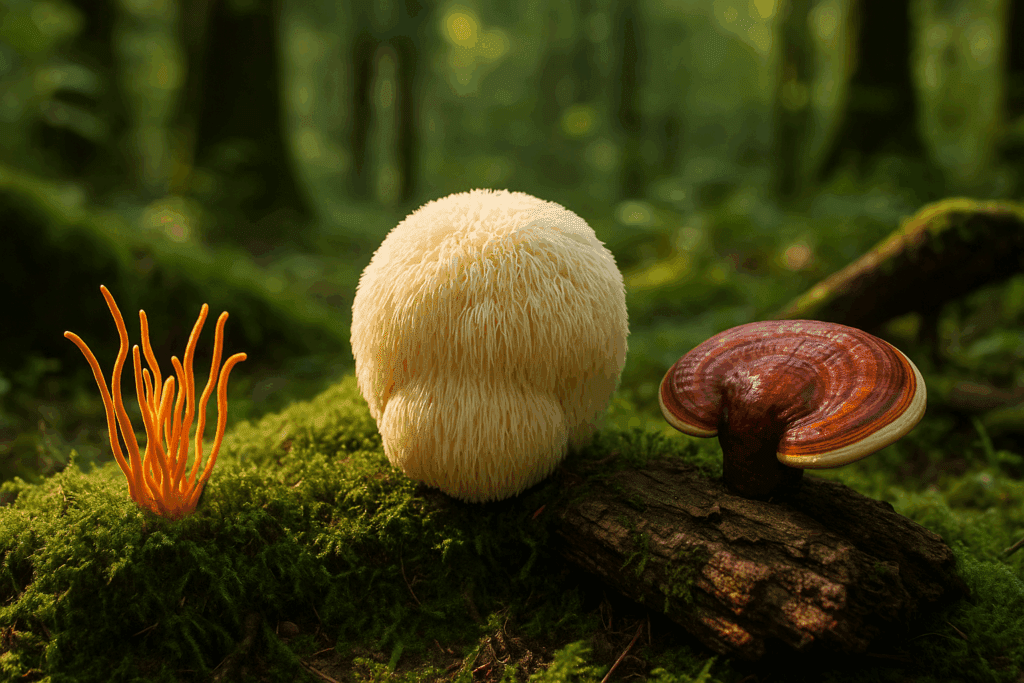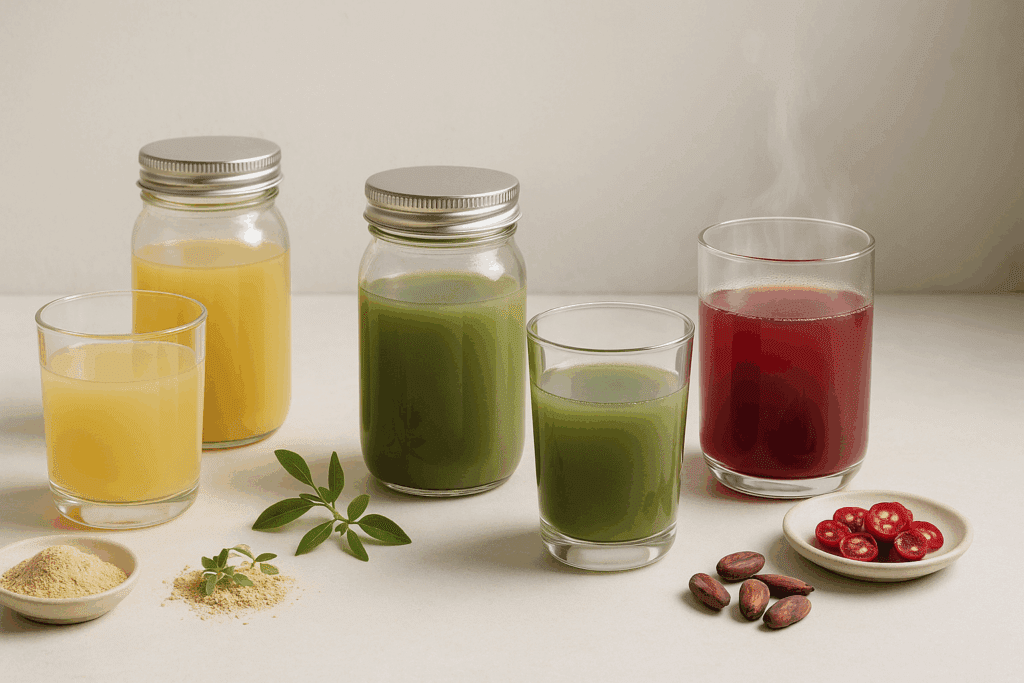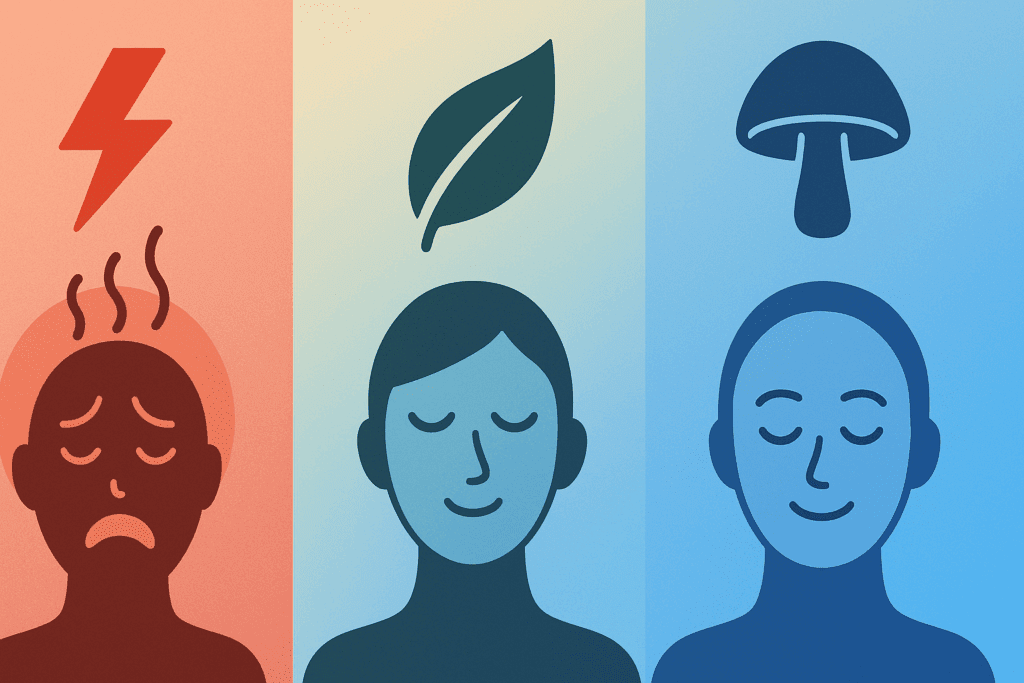The daily ritual of consuming coffee is deeply ingrained in modern culture. For many, it marks the beginning of productivity, a comforting habit, or a source of energy to fuel demanding schedules. However, a growing number of health-conscious individuals are re-evaluating their dependence on caffeine, especially in light of its effects on stress, anxiety, and overall adrenal health. For those wondering what is a good replacement for coffee, adaptogenic herbs and caffeine-free substitutes offer promising, scientifically grounded alternatives that support energy, focus, and emotional resilience without the jitters or crashes.
You may also like: Unlock Powerful Stress-Relief with Adaptogenic Mushrooms and Stamina Herbal Support

Understanding the Impact of Coffee on Stress and Energy Cycles
While coffee provides an immediate sense of alertness due to its caffeine content, it also activates the sympathetic nervous system, triggering the release of cortisol and adrenaline. This response, while helpful in acute scenarios, can contribute to long-term stress when experienced repeatedly throughout the day. Over time, excessive caffeine consumption may impair adrenal function, disrupt sleep patterns, and contribute to anxiety—a concern especially pertinent to individuals already grappling with high-stress lifestyles. Recognizing the physiological drawbacks of habitual coffee use has led researchers and wellness experts to investigate alternatives that can deliver energy in a more balanced and sustainable manner.
Moreover, caffeine tolerance varies widely among individuals. Some metabolize it efficiently, while others may experience heightened sensitivity, leading to palpitations, restlessness, and digestive disturbances. The body can also become dependent on caffeine to initiate energy production, resulting in withdrawal symptoms such as headaches, irritability, and lethargy. These patterns underscore the need for viable, healthy alternatives to coffee for energy that support the body’s natural rhythms and help manage stress effectively.

What Is a Good Replacement for Coffee When You Need Steady, Calm Energy?
If your goal is to find a beverage that invigorates without overstimulation, adaptogens emerge as exceptional candidates. These herbs and mushrooms have been used for centuries in traditional medicine systems to help the body adapt to physical and emotional stressors. Unlike caffeine, which artificially spikes energy levels, adaptogens work by enhancing the body’s resilience to stress and modulating the hypothalamic-pituitary-adrenal (HPA) axis—the core mechanism behind the stress response. When considering what is a good replacement for coffee, it becomes evident that adaptogens such as Rhodiola, Ashwagandha, and Reishi not only provide mental clarity and vitality but also help restore equilibrium.
Among the most celebrated adaptogens is Rhodiola rosea, a root traditionally used in Russian and Scandinavian medicine to improve stamina and reduce fatigue. Clinical studies indicate that Rhodiola can enhance cognitive function, reduce symptoms of burnout, and support mood stability. It offers a more even, sustainable energy uplift compared to coffee, making it one of the best alternatives to coffee for people who experience caffeine-induced anxiety or energy crashes. Similarly, Ashwagandha, an Ayurvedic staple, has demonstrated efficacy in lowering cortisol levels and improving sleep quality—an essential factor in energy restoration.

Exploring Adaptogenic Mushrooms as a Coffee Substitute for Energy
Another promising answer to the question of what is a good replacement for coffee lies in adaptogenic mushrooms. These fungi have garnered significant attention in the health and wellness community for their dual action of energizing the body and calming the nervous system. Notable examples include Cordyceps, Lion’s Mane, and Reishi—each bringing unique properties that support energy, focus, and emotional resilience.
Cordyceps is revered for its ability to increase oxygen utilization and ATP production, making it an ideal option for sustained physical energy without the side effects of caffeine. It is often recommended for athletes and those engaged in mentally demanding work. Lion’s Mane, on the other hand, supports cognitive function by promoting the synthesis of nerve growth factor (NGF), which plays a key role in neuroplasticity and mental clarity. Incorporating Lion’s Mane into your morning coffee replacement routine can enhance focus and memory while reducing the risk of caffeine-related overstimulation.
Reishi, often called the “queen of mushrooms,” is more calming in nature. It is ideal for individuals who suffer from anxiety or high cortisol levels, as it promotes a restful state without causing sedation. A blend of Reishi and Cordyceps can serve as a comprehensive coffee alternative that not only energizes but also supports emotional and immune health. Mushroom-based coffee alternative drinks now abound in the marketplace, offering rich, earthy flavors that emulate traditional coffee while providing therapeutic benefits.

The Rise of Healthy Coffee Alternatives: Functional Elixirs and Herbal Tonics
A new generation of functional beverages is reshaping how we think about morning routines. These drinks often incorporate adaptogens, medicinal herbs, and other caffeine alternatives for energy to promote wellness without overstimulating the nervous system. Brands have responded to the growing demand for caffeine-free coffee alternatives by developing formulations that include ingredients like maca root, schisandra berries, tulsi, and cacao.
Maca, a root vegetable native to the Andes, is rich in amino acids, vitamins, and minerals. It is known for its ability to support hormonal balance and enhance stamina. As a caffeine replacement, maca provides a subtle lift in energy and mood that is both stable and enduring. Schisandra, another potent adaptogen, supports liver function, detoxification, and mental clarity, making it a powerful complement in morning coffee substitute blends. Tulsi, or Holy Basil, is particularly revered in Ayurvedic medicine for its calming and adaptogenic properties, offering a gentle energy lift without spiking cortisol levels.
Cacao, when minimally processed and consumed in its raw form, can provide a sense of alertness due to its theobromine content, which is a milder stimulant than caffeine. It also contains mood-boosting compounds like phenylethylamine and anandamide, making it a healthy caffeine alternative that enhances both energy and emotional well-being. These blends are often formulated to include spices such as cinnamon and ginger, which further support digestion and circulation. As a result, functional elixirs present themselves as a compelling answer to those seeking healthy coffee alternatives that go beyond the typical caffeine model.

What Is a Good Replacement for Coffee That Tastes Familiar and Comforting?
Taste is a powerful motivator in the search for a coffee substitute. For many, the sensory experience of drinking coffee—its warmth, aroma, and bitterness—is deeply satisfying. Fortunately, several coffee alternative drinks have been formulated to mimic the taste and mouthfeel of coffee while being entirely caffeine-free. Chicory root, dandelion root, roasted barley, and carob are commonly used in these blends to replicate the robust flavor of coffee without its stimulating effects.
Chicory root, in particular, has a long history of use as a coffee alternative. When roasted, it takes on a deep, rich flavor that is remarkably similar to coffee. It also supports liver health and digestion, making it a functional as well as flavorful beverage. Dandelion root offers a slightly bitter profile and acts as a diuretic and digestive tonic. When combined with carob and barley, the result is a complex, aromatic beverage that can satisfy the craving for coffee while nourishing the body.
These blends can be enhanced with adaptogenic herbs or mushroom extracts to create coffee substitutes that taste like coffee but deliver a broader spectrum of health benefits. For instance, a dandelion-chicory blend infused with Reishi or Ashwagandha offers not just sensory satisfaction but also stress relief and immune support. As consumers seek comfort without compromise, these nuanced formulations answer the call for a healthy coffee substitute that feels familiar and indulgent.
Morning Alternatives to Coffee That Support Long-Term Wellness
Starting your day with intention involves more than just replacing your coffee habit; it calls for rethinking how energy and wellness are cultivated. Morning alternatives to coffee should not only boost alertness but also support hormonal balance, digestive function, and emotional clarity. Adaptogenic teas, golden milk, and infused water elixirs offer multidimensional benefits that align with these goals.
Adaptogenic teas often combine herbs like Rhodiola, Schisandra, and Licorice root to offer a soothing yet energizing brew. These teas support the adrenal glands, enhance endurance, and reduce fatigue, providing an elegant caffeine substitute for energy. Golden milk, a traditional Ayurvedic beverage made with turmeric, ginger, cinnamon, and a base of plant milk, offers anti-inflammatory benefits and gently energizes without relying on caffeine. The inclusion of black pepper helps with the absorption of curcumin, the active compound in turmeric, enhancing its therapeutic effects.
Infused water elixirs made with lemon, mint, cucumber, and adaptogenic tinctures are also gaining popularity as coffee replacements. These beverages hydrate the body, flush toxins, and awaken the senses with their crisp, revitalizing taste. When enhanced with adaptogenic drops or powders, they provide subtle energy and cognitive support throughout the day. The key to finding the best alternative to coffee lies in identifying what your body truly needs in the morning: hydration, calm focus, digestive support, or hormonal balance—all of which can be achieved through a thoughtful morning ritual.
Healthy Coffee Substitutes for Energy Without the Crash
One of the biggest drawbacks of coffee is the energy rollercoaster it often triggers. The initial spike in alertness can be followed by a sharp crash, leaving you more tired than before. This cyclical pattern can disrupt productivity, mood, and metabolic health. Healthy coffee substitutes for energy, particularly those rooted in adaptogenic science, help break this cycle by providing a slow-release energy boost that aligns with the body’s natural circadian rhythm.
Energy-enhancing herbs like Eleuthero (Siberian Ginseng), Panax Ginseng, and American Ginseng work by increasing the body’s resistance to physical and mental fatigue. These herbs have been extensively studied for their role in supporting mitochondrial function and enhancing stamina without stimulating the central nervous system. When combined with brain-boosting adaptogens like Lion’s Mane and calming agents like Reishi, the result is a balanced, focused energy that supports prolonged mental performance.
In addition to herbal options, incorporating protein, healthy fats, and complex carbohydrates into your morning routine can stabilize blood sugar and provide sustained energy. For example, a smoothie made with almond milk, maca, cacao, chia seeds, and a scoop of adaptogenic mushroom powder can act as a comprehensive breakfast replacement and a powerful caffeine substitute for energy. Such choices exemplify how food and herbal medicine can be harmonized to create a complete wellness approach that goes far beyond simply finding a coffee replacement.
What Is a Good Replacement for Coffee When You Need Mental Clarity and Calm?
Modern life often demands high cognitive performance coupled with emotional balance—a combination that coffee may undermine due to its over-stimulating nature. For individuals seeking to optimize brain function without sacrificing calmness, the question of what is a good replacement for coffee becomes central to their lifestyle strategy. Fortunately, several adaptogens offer neuroprotective and nootropic benefits that enhance mental clarity while reducing anxiety.
Lion’s Mane mushroom is perhaps the most well-researched natural compound for cognitive enhancement. It supports nerve regeneration, improves memory, and enhances concentration without overstimulation. Paired with calming adaptogens like Ashwagandha or Bacopa Monnieri, which reduce cortisol and improve information retention, Lion’s Mane becomes a cornerstone of a mentally uplifting yet emotionally grounding coffee replacement strategy.
Additionally, L-theanine, an amino acid found in green tea, promotes alpha brain wave activity, which is associated with a state of relaxed alertness. While green tea does contain caffeine, it is far less than coffee, and the presence of L-theanine helps buffer its effects, making it a healthy caffeine alternative. For those who still want a small amount of caffeine but without the volatility, matcha or green tea paired with adaptogens can provide the ideal balance.

Caffeine Alternatives That Align with Stress Management Goals
Incorporating caffeine alternatives that promote long-term stress resilience requires an understanding of how different substances interact with the endocrine system. Coffee stimulates the adrenal glands, prompting them to release cortisol. While this can enhance short-term energy, repeated activation leads to adrenal fatigue and increased stress susceptibility. Replacing coffee with adaptogenic and nutrient-rich alternatives can buffer the effects of stress and promote hormonal homeostasis.
For example, Tulsi tea supports the HPA axis, reduces inflammation, and balances blood sugar levels. Regular consumption has been linked to improved mood and lower stress markers. Pairing Tulsi with Schisandra and Licorice root can enhance liver detoxification and adrenal support, offering a holistic approach to caffeine-free coffee alternatives. These herbs do not simply mask fatigue; they address its root causes by nourishing the body’s adaptive systems.
Moreover, magnesium-rich drinks such as cacao or herbal infusions made with nettle or oat straw can calm the nervous system and replenish minerals depleted by chronic stress. Magnesium plays a key role in over 300 biochemical reactions and is essential for muscular relaxation, nervous system regulation, and sleep quality. Choosing such mineral-rich beverages is a vital part of selecting a healthy caffeine alternative that nourishes rather than depletes.
Frequently Asked Questions: Discovering What Is a Good Replacement for Coffee
What is a good replacement for coffee that supports long-term cognitive performance?
For individuals aiming to maintain cognitive sharpness without relying on caffeine, certain adaptogens and nootropic compounds offer a promising alternative. Lion’s Mane mushroom, for example, is increasingly researched for its role in promoting nerve regeneration and protecting against age-related cognitive decline. When paired with Bacopa Monnieri—a plant shown to improve memory and processing speed—the duo forms a caffeine substitute for energy that also nurtures brain health. Beyond herbs, phosphatidylserine and L-tyrosine are two nutrients often found in healthy coffee replacement products designed for focus and clarity. By combining these compounds in a morning drink or smoothie, users can enjoy long-lasting mental stamina without experiencing the anxiety or crashes associated with traditional caffeine alternatives to coffee.
Are there coffee alternatives for energy that also improve gut health?
Yes, there are several coffee substitute options that actively promote digestive wellness while offering natural energy support. Roasted chicory root, a common ingredient in many caffeine free coffee alternative blends, acts as a natural prebiotic that fosters a healthy gut microbiome. Dandelion root, another popular ingredient in coffee substitute drinks, stimulates bile production, thereby aiding in fat digestion and liver function. When these are combined with adaptogens like ginger or turmeric, the result is a coffee alternative drink that energizes the body while supporting gastrointestinal balance. Such healthy caffeine alternatives are particularly useful for individuals prone to bloating or indigestion, common side effects of high caffeine intake.
What is a good replacement for coffee when transitioning off caffeine gradually?
Gradual transitions are often more successful than abrupt withdrawals, especially when caffeine has been a daily ritual. Start by blending reduced caffeine drinks such as half-caf or green tea with calming adaptogens like Ashwagandha. Over time, these can be replaced entirely by caffeine alternatives like matcha lattes or mushroom-infused elixirs. A coffee replacement for energy that mimics the flavor and richness of traditional coffee—such as blends using roasted carob, chicory, or barley—can provide a satisfying sensory substitute during this transition. The key is to support your adrenal system while keeping energy levels stable, which can be achieved by including a mix of adaptogens and B-vitamin-rich superfoods.
Can coffee alternative drinks help reduce cortisol levels and stress?
Yes, many of the best alternative to coffee options are specifically formulated to address stress-induced fatigue and cortisol dysregulation. Herbs like Tulsi, Rhodiola, and Holy Basil are central to healthy coffee substitutes that actively modulate the stress response by regulating the hypothalamic-pituitary-adrenal (HPA) axis. Unlike caffeine, which spikes cortisol, these adaptogens promote resilience and recovery. Pairing them with magnesium-rich ingredients like oat straw or nettle infusions can further calm the nervous system. This dual-action approach—providing energy while downregulating stress—makes such drinks excellent choices for anyone looking for a good substitute for coffee that enhances overall emotional well-being.
What is a good alternative to coffee that can be consumed in the evening?
If you’re looking for a coffee substitute for energy that won’t disrupt your sleep, options like Reishi mushroom lattes or caffeine free herbal tonics are ideal. Reishi is known for its calming, immune-supporting properties and can be combined with nut milk and cinnamon to create a soothing bedtime drink. Other nighttime-friendly ingredients include chamomile, lavender, and ashwagandha, which provide subtle mood elevation without interfering with melatonin production. These beverages work well as part of an evening routine, serving as a healthy caffeine alternative that promotes rest and recovery. Unlike traditional coffee or even green tea, these drinks support circadian health and reduce overstimulation.
What are some coffee substitutes that taste like coffee but offer health benefits?
Taste plays a major role in habit formation, which is why many caffeine alternatives aim to replicate the sensory experience of coffee. Coffee substitutes that taste like coffee typically use roasted roots like chicory and dandelion, which create a dark, bitter brew reminiscent of espresso. When blended with cocoa, vanilla, or spices like cardamom, these drinks become deeply satisfying and complex. They can be further enhanced with adaptogens or medicinal mushrooms, transforming them into healthy coffee replacement beverages that not only taste great but also support hormonal balance and energy. These substitutes are especially popular among those who miss the ritual of coffee but seek a healthier, caffeine-free experience.
What are the social or psychological benefits of switching to a morning coffee substitute?
Shifting from coffee to a morning alternative can have subtle but profound social and psychological impacts. Rituals around coffee often carry emotional significance, so replacing them with equally meaningful practices can support mental wellness. Preparing a nourishing adaptogenic tonic in the morning can serve as a mindful, grounding activity that promotes intention and calm. Moreover, choosing a coffee replacement for energy that aligns with health values can enhance self-esteem and consistency in wellness routines. Over time, these patterns reinforce resilience and self-awareness, transforming the morning beverage from a stimulant crutch to a nourishing self-care ritual.
What can I substitute for coffee if I have adrenal fatigue or hormonal imbalances?
People with adrenal fatigue or hormonal imbalances often need to avoid caffeine entirely, as it exacerbates cortisol spikes and hormonal fluctuations. In these cases, the healthiest coffee substitutes are those that nourish endocrine function. Maca root, for instance, is a known adaptogen that supports hormonal balance and fertility. Schisandra and licorice root also support adrenal recovery and liver detoxification, making them ideal components of a healthy coffee alternative. By choosing caffeine alternatives for energy that contain these ingredients, individuals can gently restore balance without depleting their adrenal reserves, offering long-term wellness rather than temporary stimulation.
How do caffeine alternatives support athletic performance or physical stamina?
Several caffeine alternatives to coffee offer excellent benefits for athletes or those with physically demanding lifestyles. Cordyceps mushroom, for example, has been shown to improve oxygen utilization and ATP production, enhancing physical endurance without raising heart rate or blood pressure. Eleuthero (Siberian Ginseng) and Panax Ginseng are additional caffeine substitutes for energy that improve muscle recovery and immune resilience. These substances are often integrated into pre-workout elixirs or smoothies to provide a steady source of vitality. For those looking for a substitute for caffeine that supports both mental and physical performance, adaptogenic blends provide a comprehensive, stimulant-free solution.
What is a good replacement for coffee that supports metabolic health and blood sugar balance?
For those managing metabolic health concerns such as insulin resistance or blood sugar instability, finding a coffee alternative that doesn’t spike glucose is essential. Caffeine can interfere with glucose metabolism, especially when consumed on an empty stomach. In contrast, cinnamon, fenugreek, and bitter melon are often used in caffeine replacement drinks to promote healthy blood sugar regulation. When blended with fiber-rich adaptogens like flaxseed or inulin, these ingredients help maintain energy levels without the highs and lows associated with caffeine. Such healthy alternatives to coffee for energy can be seamlessly integrated into breakfast routines to support metabolic resilience while still offering a satisfying, warm beverage experience.
Reflecting on the Best Alternatives to Coffee for Long-Term Wellness
In a world where the pace of life continually accelerates, it is imperative to choose energy sources that enhance rather than compromise well-being. The search for what is a good replacement for coffee leads us to a diverse array of adaptogenic herbs, functional mushrooms, and plant-based elixirs that offer more than just a temporary boost. These alternatives address the root causes of fatigue and stress, support cognitive function, and nourish the body holistically.
Whether you are drawn to the earthy richness of mushroom-based brews, the calming focus of adaptogenic teas, or the revitalizing effects of golden milk and infused waters, there exists a coffee substitute for every palate and wellness goal. By embracing healthy coffee alternatives that align with the principles of balance, sustainability, and personalized care, we can redefine our morning rituals and foster a deeper, more mindful relationship with energy itself.
As this new wave of wellness takes root, we are reminded that true vitality arises not from stimulation, but from harmony within the body and mind. Choosing a coffee replacement is not merely about eliminating caffeine—it is about honoring our natural rhythms, supporting resilience, and cultivating a lifestyle that thrives on calm, steady energy. Through thoughtful experimentation and the integration of adaptogens, we open the door to a more centered, energized, and fulfilling life experience.
Further Reading:
I Quit Coffee: This Is What I Drink Instead
10 Excellent Coffee Substitutes for People Looking to Ease Those Jitters
